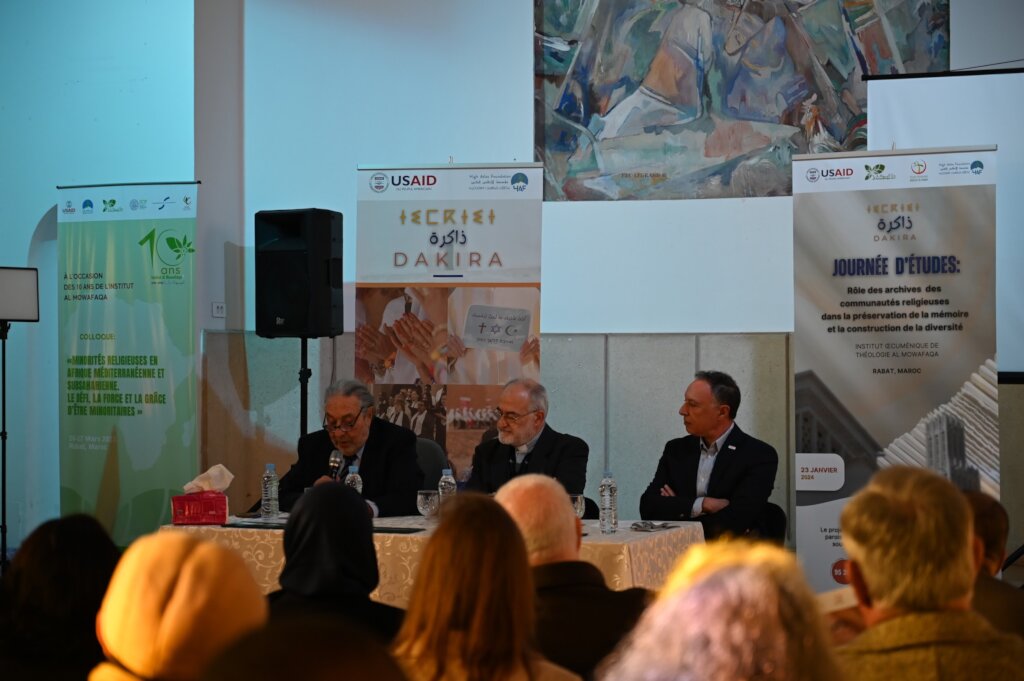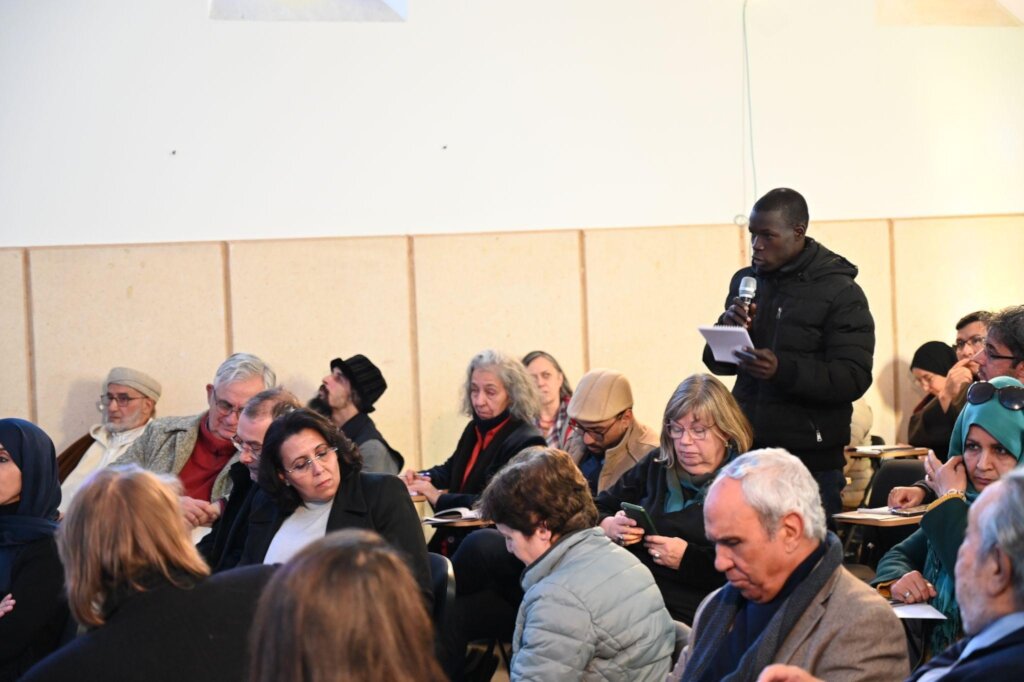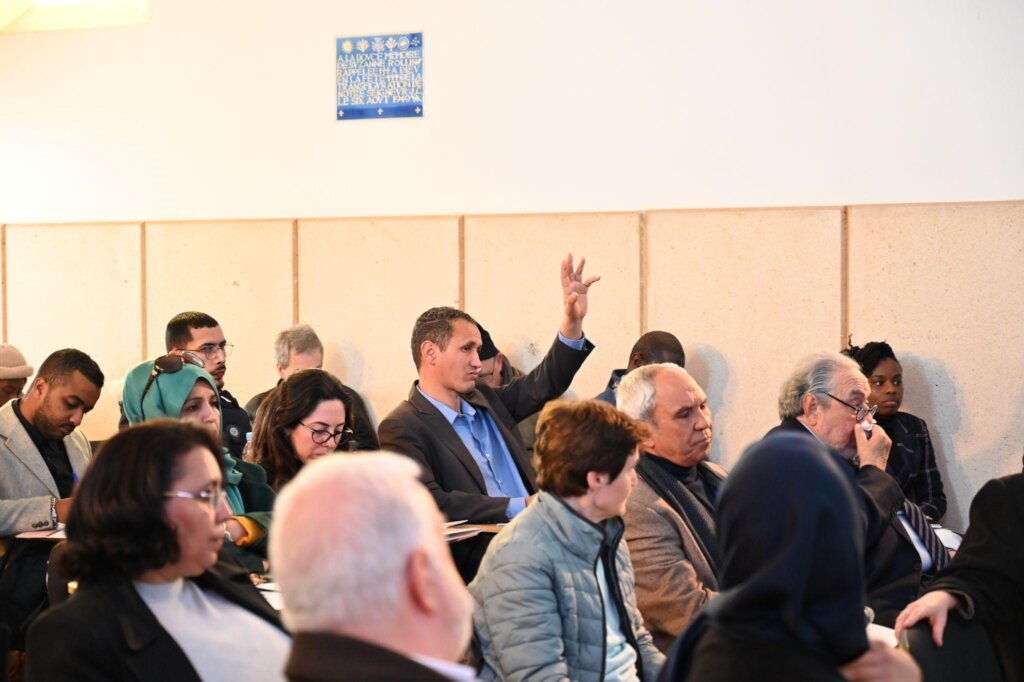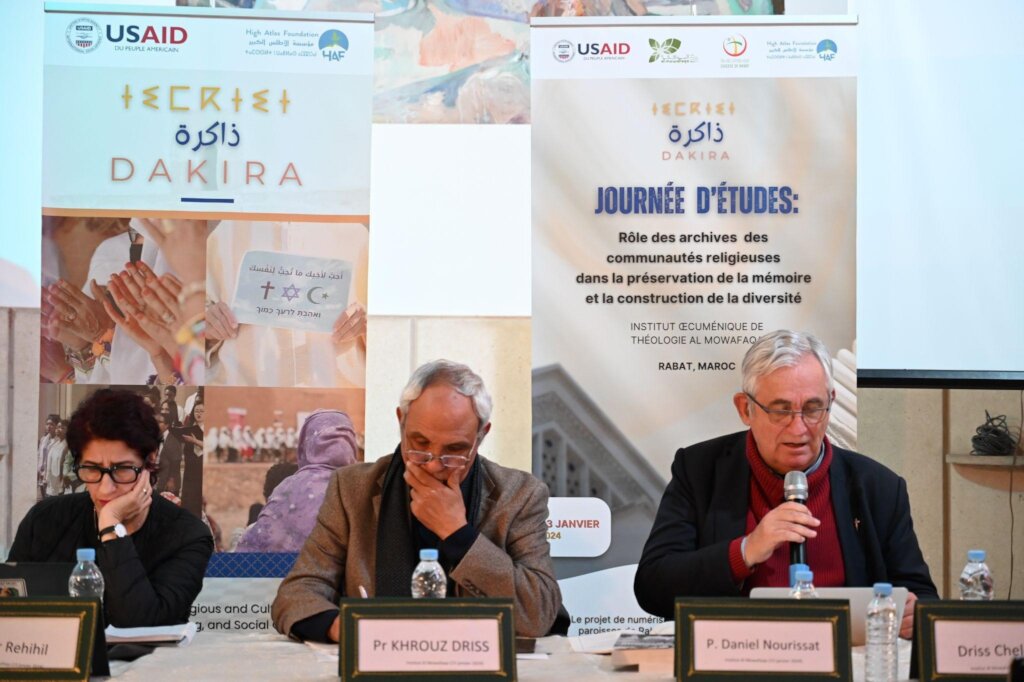By Soukaina Kherdioui | Dakira Communications Specialist
On January 23, 2024, in partnership with the Diocese of Rabat and the Al Mowafaqa Institute, the High Atlas Foundation organized a study day entitled “The Role of Religious Communities Archives in the Preservation of Collective Memory and the Promotion of Diversity.”
The event is part of the USAID-funded Dakira Program implemented by the High Atlas Foundation and its partners.
Held at the Al Mowafaqa Institute, the study day was an opportunity to present some of the program's key milestones, namely the digitization of the archives of the Diocese of Rabat.
The event provided a platform for knowledge exchange and joint reflection, bringing together scholars, historians, religious leaders, and community members of different backgrounds to reflect on the role of archives digitization on past, current and future generations in promoting diversity, thus contributing to a greater understanding of our common history.
Welcoming addresses were given by Monsignor Cristobal Lopez Romero, Archbishop of Rabat, his Excellency Mr. Serge, Secretary General of the Council of the Jewish Communities of Morocco, and Mr. Idriss, USAID Morocco representative.
In his opening remarks, Cardinal Cristobal Lopez thanked all in attendance for joining the study day to celebrate and reflect on the accomplishments achieved through the successful partnership with the Diocese of Rabat.
“The Diocese of Rabat initiated the safeguarding project of the ecclesiastical archives to preserve the memory of the Catholic community in Morocco, leaving a lasting testimony to the existence of the Catholic Church and the religious diversity of Morocco.
To this end, we successfully collaborated with two volunteers who had worked to recover all the documents across various parishes and locations of the archdiocese and to prepare suitable places for their conservation in good conditions.
[...] At a second stage, the aim was to digitize the most precious documents of these archives, namely the Catholicity registers and religious publications, [a milestone] which we have achieved thanks to the invaluable support of the High Atlas Foundation and USAID,” he noted.
For his part, Mr. Serge reiterated the importance of the preservation of religious archives in perpetuating Morocco’s collective memory: “the Moroccan Jewish community has contributed to writing our shared history.
It has sown seeds that have already produced beautiful seedlings recognizing the past and the continuity of history [...] The Moroccan exception, ladies and gentlemen, deserves respect, attention, but also care,” he added.
Through panel discussions, presentations, and interactive sessions, participants delved into the multifaceted role of religious archives that not only serve as a testament to the beliefs and practices of various religious traditions but also offer valuable insights into the social, cultural, and political contexts in which they emerged.
The morning panel gave an overview of the Catholic archives. According to Father Oscar Eone Eone, Chancellor Archivist of the Archdiocese of Rabat, the first step that paved the way for the digitization project was the centralisation of the archives of the diocese of Rabat that was completed back in September 2022.
“In fact, the concerned archives are being preserved following a specific ranking in three different rooms with controlled humidity.
The archives include documents on the congregation correspondences of Saint Siege, handwritten correspondences of the vicars apostolic and the archbishops of Rabat before the ecclesiastical district of Rabat became a diocese, correspondences between the various archbishops of Rabat and the local authorities of the Kingdom of Morocco, [...] catholicity registries, as well as educational catholic archives [...]” he added.
The digitization project included 95 380 individual baptismal records drawn up from 1950 to 1990 have been digitized; 427 registries from 1920 to the present, attesting to over 200,000 baptismal certificates and 100,000 marriage certificates; Catholic magazines, namely the magazine entitled “Ensemble” which has maintained a continuous uninterrupted stream of publications since its creation in 1947.
These magazines and archives can be accessed on the official website of the diocese.
La Source Library: A place that bears witness to history in all its diversity
In the afternoon session, Father Daniel Nourissat recounted the story of some of the archives which have been part of the digitization project, implemented as part of the USAID-funded Dakira program.
La Source library, currently housing the Al Mowafaqa Institute in Rabat, played a pivotal role in fostering interfaith dialogue between the Christian community and Morocco.
Established in 1929 to cater to the educational needs of the Franciscan community in Rabat, who expressed a desire to deepen their understanding of Morocco, its history, languages, and Islam, the library evolved into a documentation center primarily serving the Christian community in Rabat.
Inspired by Morocco’s diversity and in recognition of the importance of linguistic and cultural immersion, Monsignor LeFévre, the apostolic vicar of Rabat, advocated for the establishment of a cultural center that offers courses in Arabic language and Islamic studies to priests.
In 1952, La Source was established as a cultural center to introduce religious individuals arriving in Morocco to the country’s economic, religious, cultural, and linguistic intricacies.
It subsequently expanded its resources, establishing a comprehensive library dedicated to various aspects of Morocco’s culture and history. “According to Jamaâ Baïda et Vincent Feroldi's work on the history of the Christian community in Rabat, the center welcomed Christian, Muslim, and Jewish students.
Additionally, starting 1954, it organized social events aimed at fostering understanding and dialogue among diverse religious communities in Morocco,” he noted.
In 1981, Father Jacques Levrat assumed the role of director of La Source, thereby transforming it into a study and research center serving both Christians and Muslims.
The establishment boasted a library containing 35,000 publications, making it one of the few university-level libraries available in Morocco during that period. Numerous Moroccan students utilized this resource for their research studies.
The center's primary objective was to cater to Moroccan intellectuals while also facilitating interfaith dialogue and collaboration between Christians and Muslims.
La Source became well frequented, with approximately 700 visitors per month. Scholars found the environment conducive to their scholarly pursuits and enduring cross-cultural friendships were forged as the setting fostered dialogue, with monthly gatherings organized around the exploration of a particular book and its author, or featuring presentations by Moroccan scholars to showcase their research findings.
When the National Library of the Kingdom of Morocco (NLKM) was established, the Catholic Church in Morocco opted to transfer the collection of 35,000 works to the NLKM, which allocated a dedicated space for the archives to ensure their preservation and better accessibility.
This decision was motivated by the desire to preserve the collection as a unified cultural asset, which holds inherent value for scholarly inquiry.
This transition enabled a broader audience to access the works, which nonetheless remain the property of the Catholic Church in Morocco.
Today, archives digitization ensures an even longer-term preservation and greater accessibility. The archives housed within the Diocese of Rabat not only chronicle the narrative of the Christian community in Morocco over the past two centuries but also encapsulate the broader history of the nation.
They comprise systematically documented testimonies and poignant snapshots of various historical epochs, echoing Morocco’s vibrant patrimony.
Their digitization represents a crucial step toward preserving this invaluable interfaith heritage as well as reviving opportunities for interfaith dialogue and knowledge transmission among the country’s diverse religious and ethnic communities.
Through the archives digitization project, the Dakira program aspires to ensure that such valuable collections that gave birth to cross-cultural and interfaith gatherings continue to inspire and guide future generations, for these archives are essential sources, traces and testimonies of a past marked by mutual understanding and unity.
By Nouhaila ELfatimi | HAF Program Coordinator
By Aloys Trinker and Bernhard Fritz | Interns
Project reports on GlobalGiving are posted directly to globalgiving.org by Project Leaders as they are completed, generally every 3-4 months. To protect the integrity of these documents, GlobalGiving does not alter them; therefore you may find some language or formatting issues.
If you donate to this project or have donated to this project, you can recieve an email when this project posts a report. You can also subscribe for reports without donating.
Support this important cause by creating a personalized fundraising page.
Start a Fundraiser


